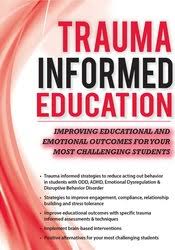As an educator, you are expected to teach and engage children—even those with the most challenging behaviors. These are the students that no matter what you try, you just can’t reach them.
Robert Hull – Trauma-Informed Education
Trauma-informed strategies to reduce acting out behavior in students with ODD, ADHD, Emotional Dysregulation & Disruptive Behavior Disorder
Strategies to improve engagement, compliance, relationship building and stress tolerance
Improve educational outcomes with specific trauma informed assessments & techniques
Implement brain-based interventions
Positive alternatives for your most challenging students
As an educator, you are expected to teach and engage children—even those with the most challenging behaviors. These are the students that no matter what you try, you just can’t reach them. Like the boy with disruptive behaviors that keep him sitting in the principal’s office. Or the student that struggles to focus and complete assignments. What about the girl who is completely withdrawn? Is she even more challenging than the boy with the aggressive outbursts?
If your current interventions are not reducing these challenging behaviors, then you need to attend this program! Join leading education expert Robert Hull, as he teaches you evidence-based trauma-informed education strategies that will reduce the achievement gap, decrease referrals for highly restrictive special education programs, as well as drastically improve:
Emotional functioning
Acting out behaviors
Aggressive behaviors
Relationships
Student engagement
Using a trauma-informed approach will create an affiliation between teacher, student and family member that leads them to all work together for success rather than constantly being in conflict.
It’s a revolution in education that will help you connect with your most challenging students!
Identify behavioral episodes that challenge educators, professionals, therapists and parents.
Discuss the contribution that a trauma history makes on the following disorders: ODD, ADHD, Emotional Dysregulation and Disruptive Behavior Disorders.
Implement clinical ideas into educational practice to improve positive engagement and student performance.
Demonstrate how to utilize peer relationship coaching to reduce bullying and improve student acceptance and inclusion in social groups.
Outline growth strategies to build core strengths, improve grit, perseverance and determination and move beyond resilience to post traumatic growth.
Illustrate brain-based strategies for emotional management, executive functioning and accelerated learning using the newest research in brain functioning.
Describe teaching techniques and methods that include new and exciting methods to challenge students to do their very best.
Would you like to receive Robert Hull – Trauma-Informed Education ?
The Impact of Trauma on School Functioning and Classroom Instruction
How the traumatic experiences of students manifest in school settings
Academics & cognitive skills
Behavioral functioning
Social emotional functioning
Developmental differences in response to trauma
Impact of trauma on the following disorders:
ODD
ADHD
Emotional Dysregulation
Disruptive Behavior Disorders
Childhood trauma and a framework for intervention
Attachment
Self-regulation
Competency
STRATEGIES, TECHNIQUES & INTERVENTIONS TO ADDRESS TRAUMA & OTHER BARRIERS TO LEARNING
Interventions to Reduce Disruptive Behavior and Suspension Rates
Turning rage and helplessness into constructive action
Effectively confront loss and grief
Proactively utilize mindfulness
Address anger regulation and expression
Teach students how to relax, reframe and cope
Strategies to Increase Motivation, Engagement and Academic Success
Promote grit tenacity and perseverance
Turn moral disengagement into moral engagement
Create opportunities for meaningful connection and affiliation
Establish brain-based interventions
Utilize effective praise as a motivator
Manage YOUR frustration
Move from reactive to proactive
Skills and Competencies to Help the Student Overcome Challenging Situations
Engage thinking to mitigate emotional reactivity
Increase access and use of executive functioning skills
Making and keeping commitments
Integrate stress reduction into the daily schedule
Embed executive functioning strategies into the daily routine
Expand the range of competencies
Techniques to Develop School-wide Resilience & Create Trauma-Sensitive Schools
Flexible Framework: a systematic overview that identifies, integrates and ensures compliance
Systems to create safe, supportive schools for students impacted by traumatic experiences








